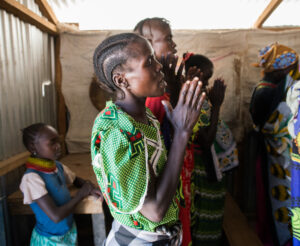“You’re 12, you’re old enough to share your testimony of salvation” – my father said to me out of the blue one Saturday evening, to my astonishment, as I had little personal faith at the time. After that conversation, I realised that if I was going to take faith seriously and talk to people about Jesus, then I needed to know Him first. And to do that, I needed to read my Bible.
My home is in the Eastern part of Kenya, about 175km from Nairobi. On a clear morning we can see the very top of Mount Kenya. My grandparents were among some of the first to become followers of Jesus when the missionaries from Church Missionary Society (CMS) came to our area.
My father was an ordained Anglican priest, so we were not short of Bibles, and I was able to grow up with a strong knowledge of Christian theology.
Unable to read the Bible
Unfortunately, my story is not the norm across Kenya. True, not everyone has a priest for a father, but the problem is not a lack of Bibles. It is the inability of many Kenyan communities to read them.
Illiteracy is a significant obstacle to developing a personal relationship with Jesus, if we cannot read the Bible, how can we get to know Him? Many people in my country are therefore completely reliant on their pastor’s teachings to get around this. But lots of these pastors have a limited understanding of theology too, which can result in the blind leading the blind. This can be a challenge even for those who can read, due to the lack of access to Bibles which have been translated into the mother tongue of such communities.
Fortunately, concerted efforts are being made by local Bible translators to ensure that these communities can read and hear the Bible in their mother tongue, thanks in part to Langham Literature and Langham Scholars.
Resourcing indigenous leaders
When I came back home to Kenya after studying in the UK, I was introduced to Langham Partnership – a global charity which equips and resources indigenous leaders around the world to multiply disciples – through a preaching seminar in Uganda. By the end of the seminar, I had volunteered and committed myself to help coordinate the formation of ‘preaching clubs’ around the country, so that the pastors who attended the seminar could continue practising what they had learned.

Over the next few years, I visited pastors who were working among some of the unreached people groups in Northern Kenya and was exposed to their inspiring passion for reaching these communities with the gospel, but also to their low literacy levels. As a result, Langham Preaching developed seminars designed to be completely oral to support and equip these pastors with biblical preaching skills.
It was at one of these seminars that I was first asked to share the gospel. Sitting before me was a congregation who held no Bibles, and nor could many understand Kiswahili, the main language in Kenya in which I preached. The pastor had to interpret my sermon into their local language to ensure the gospel message came across correctly.
Reaching the unreached
However, the impact of that sermon was brought home to me five months later when I revisited the congregation and a little girl came running up to me and repeated some of my sermon. I was speechless. The girl had been present in the church on the day I preached there, remembered it, and was now reading the Bible to her illiterate parents to help them understand it, as were many of the other children.
Oral teaching is key to reaching the unreached in Majority World nations, if people cannot hear about Jesus, how can they get to know Him? Partnerships are essential in gospel work, and I have grown to appreciate just how important our partnership with local UK churches is. Much of our work stems from you, and your churches have just as much ownership and play just as essential a role in establishing God’s kingdom and reaching those who have not heard of Jesus as we do.
By Mercy Ireri, Langham Preaching Coordinator, Kenya


